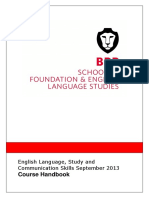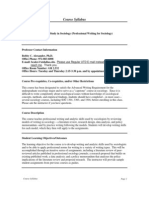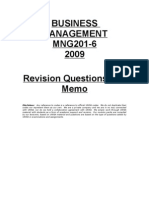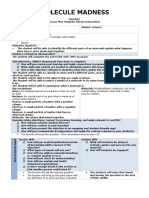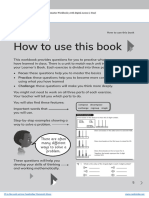Fletcher Stewart-Chester Opoi
Fletcher Stewart-Chester Opoi
Uploaded by
api-543293721Copyright:
Available Formats
Fletcher Stewart-Chester Opoi
Fletcher Stewart-Chester Opoi
Uploaded by
api-543293721Original Title
Copyright
Available Formats
Share this document
Did you find this document useful?
Is this content inappropriate?
Copyright:
Available Formats
Fletcher Stewart-Chester Opoi
Fletcher Stewart-Chester Opoi
Uploaded by
api-543293721Copyright:
Available Formats
American Council on the Teaching of Foreign Languages
certifies that
Fletcher Stewart-Chester
Test Type Test Date Language
Oral Proficiency Interview 12/09/2019 Spanish
has successfully completed the ACTFL Oral Proficiency Interview (OPI) and has been rated
according to the ACTFL Proficiency Guidelines 2012 – Speaking
Advanced High
Howard Berman, Executive Director, ACTFL
Date Issued: 12/09/2019
Date of Expiration: 12/09/2021
Certificate Code: 3558374-ECDEC9
Issued by: LTI
• Advanced High - ACTFL Proficiency Guidelines 2012 - Speaking
Advanced High
Speakers at the Advanced-High level perform all Advanced-level tasks with linguistic ease, confidence
and competence. They are able to consistently explain in detail and narrate fully and accurately in all time
frames. In addition, Advanced-High speakers handle the tasks pertaining to the Superior level but cannot
sustain performance at that level across a variety of topics. They can provide a structured argument to
support their opinions, and they may construct hypotheses, but patterns of error appear. They can discuss
some topics abstractly, especially those relating to their particular interests and special fields of expertise, but
in general, they are more comfortable discussing a variety of topics concretely. Advanced-High speakers
may demonstrate a well-developed ability to compensate for an imperfect grasp of some forms or for
limitations in vocabulary by the confident use of communicative strategies, such as paraphrasing,
circumlocution, and illustration. They use precise vocabulary and intonation to express meaning and often
show great fluency and ease of speech. However, when called on to perform the complex tasks associated
with the Superior level over a variety of topics, their language will at times break down or prove inadequate,
or they may avoid the task altogether, for example, by resorting to simplification through the use of
description or narration in place of argument or hypothesis.
You might also like
- Mastering CELPIP Speaking: Strategies, Tips, and Practice for SuccessFrom EverandMastering CELPIP Speaking: Strategies, Tips, and Practice for SuccessRating: 5 out of 5 stars5/5 (1)
- 4 Stages of Tabors and SnowDocument6 pages4 Stages of Tabors and SnowCamelia SeruNo ratings yet
- EF SET CertificateDocument1 pageEF SET CertificatemarvinkpxNo ratings yet
- Lti CertificateDocument1 pageLti Certificateapi-382813061No ratings yet
- Opi CertificateDocument1 pageOpi Certificateapi-337709004No ratings yet
- Actfl Opi CertificateDocument1 pageActfl Opi Certificateapi-242936638100% (1)
- Medinaresume 18Document2 pagesMedinaresume 18api-400080530No ratings yet
- Opi Advanced HighDocument1 pageOpi Advanced Highapi-543176821No ratings yet
- Opi ScoreDocument1 pageOpi Scoreapi-538855116No ratings yet
- SophieDocument1 pageSophieapi-650690852No ratings yet
- Clayton Varvel OpiDocument1 pageClayton Varvel Opiapi-539551305No ratings yet
- American Council On The Teaching of Foreign Languages: Jonghyun LeeDocument2 pagesAmerican Council On The Teaching of Foreign Languages: Jonghyun LeePaul LeeNo ratings yet
- Chance Mccutcheon OpiDocument1 pageChance Mccutcheon Opiapi-467632033No ratings yet
- Actfl CertificateDocument1 pageActfl Certificateapi-496769438No ratings yet
- Marlee Evans OpiDocument1 pageMarlee Evans Opiapi-534520189No ratings yet
- Opi Span 493Document1 pageOpi Span 493api-537779728No ratings yet
- American Council On The Teaching of Foreign Languages: Corben LambDocument1 pageAmerican Council On The Teaching of Foreign Languages: Corben Lambapi-650563643No ratings yet
- Actfl Speaking Certificate Advanced-LowDocument1 pageActfl Speaking Certificate Advanced-Lowapi-321347939No ratings yet
- Advancedmid CertificateDocument1 pageAdvancedmid Certificateapi-656238859No ratings yet
- Opi CertificateDocument1 pageOpi Certificateapi-454162850No ratings yet
- Emily Heeb OpiDocument1 pageEmily Heeb Opiapi-400093436No ratings yet
- Jarvis OpiDocument1 pageJarvis Opiapi-661525279No ratings yet
- Span 493 - OpiDocument1 pageSpan 493 - Opiapi-661190541No ratings yet
- Rebecca Halls OpiDocument1 pageRebecca Halls Opiapi-691371349No ratings yet
- Opi CertificateDocument1 pageOpi Certificateapi-398507395No ratings yet
- Jeremiah Tolento OpiDocument1 pageJeremiah Tolento Opiapi-692084742No ratings yet
- Isana Garcia OpiDocument1 pageIsana Garcia Opiapi-497558934No ratings yet
- Bryce Nielson OpiDocument1 pageBryce Nielson Opiapi-676934768No ratings yet
- Speaking Opi Certificate-Yang LiuDocument1 pageSpeaking Opi Certificate-Yang Liuapi-656272032No ratings yet
- Maya Lavery OpiDocument1 pageMaya Lavery Opiapi-508119747No ratings yet
- Mecham OpiDocument1 pageMecham Opiapi-400185525No ratings yet
- Kallan Taylor OpiDocument1 pageKallan Taylor Opiapi-728258793No ratings yet
- William Kaelin OpiDocument1 pageWilliam Kaelin Opiapi-533706378No ratings yet
- Jordan Hess OpiDocument1 pageJordan Hess Opiapi-392556671No ratings yet
- CertificateDocument1 pageCertificateapi-396517404No ratings yet
- Austin Petty OpiDocument1 pageAustin Petty Opiapi-718630750No ratings yet
- Tyler Dalton OpiDocument1 pageTyler Dalton Opiapi-707657408No ratings yet
- Opi CertDocument1 pageOpi Certapi-252838684No ratings yet
- Joshua Rhead OpiDocument1 pageJoshua Rhead Opiapi-543214822No ratings yet
- ActflcertificateDocument1 pageActflcertificateapi-380689341No ratings yet
- CertificateDocument1 pageCertificateapi-313196595No ratings yet
- CertificateDocument1 pageCertificateapi-313196550No ratings yet
- American Council On The Teaching of Foreign Languages: Taylor HaycockDocument1 pageAmerican Council On The Teaching of Foreign Languages: Taylor Haycockapi-314084090No ratings yet
- Writing Opi-Certificate Yang LiuDocument1 pageWriting Opi-Certificate Yang Liuapi-656272032No ratings yet
- Actfl Oral Proficiency Interview by Computer Test (Opic) Answers To Frequently Asked QuestionsDocument4 pagesActfl Oral Proficiency Interview by Computer Test (Opic) Answers To Frequently Asked QuestionswunderdanNo ratings yet
- Brianna Stroud Wenger Opi 1Document1 pageBrianna Stroud Wenger Opi 1api-692066908No ratings yet
- Marlee Evans WPTDocument1 pageMarlee Evans WPTapi-534520189No ratings yet
- Opi CertificateDocument1 pageOpi Certificateapi-313196559No ratings yet
- Actfl Oral Proficiency Interview by Computer Test (Opic) Answers To Frequently Asked QuestionsDocument6 pagesActfl Oral Proficiency Interview by Computer Test (Opic) Answers To Frequently Asked QuestionsLily Deang de VeraNo ratings yet
- CertificateDocument1 pageCertificateapi-317462285No ratings yet
- LLIVISACA RAMOS Level Test 23 - 02 - 2024Document2 pagesLLIVISACA RAMOS Level Test 23 - 02 - 2024Erick LlivisacaNo ratings yet
- CertificateDocument1 pageCertificateapi-357292265No ratings yet
- Opi CertificateDocument1 pageOpi Certificateapi-313196525No ratings yet
- Opi ScoresDocument1 pageOpi Scoresapi-313860986No ratings yet
- 5 English Course Upper IntermediateDocument6 pages5 English Course Upper IntermediatecrengutsaNo ratings yet
- Efset Test RaniaDocument1 pageEfset Test RaniaSADOUNI TewfikNo ratings yet
- Assessing Speaking - 2 - For StudentsDocument19 pagesAssessing Speaking - 2 - For StudentskondratiukdariiaNo ratings yet
- CertificateDocument1 pageCertificateapi-268605327No ratings yet
- English Language and Communication Skills (PDFDrive)Document75 pagesEnglish Language and Communication Skills (PDFDrive)asma rajabNo ratings yet
- Certificate OpiDocument1 pageCertificate Opiapi-281365898No ratings yet
- Emmalee Wilding WPTDocument1 pageEmmalee Wilding WPTapi-541664577No ratings yet
- Sample Pages of DocumentationDocument4 pagesSample Pages of Documentationb24937094No ratings yet
- Strategies - GistDocument4 pagesStrategies - Gistapi-260878103No ratings yet
- Brent Shaw, Family in Late Antiquity. The Experience of AugustineDocument50 pagesBrent Shaw, Family in Late Antiquity. The Experience of AugustineSantiago ArgüelloNo ratings yet
- English8 Q2 Mod3 Compare and Contrast Same Topic in Different Multimodal TextsDocument24 pagesEnglish8 Q2 Mod3 Compare and Contrast Same Topic in Different Multimodal TextsBlonde Yoldan0% (1)
- How To Find A Job Using LinkedInDocument4 pagesHow To Find A Job Using LinkedInRam (rams1)No ratings yet
- UT Dallas Syllabus For Soc4v97.012.11f Taught by Bobby Alexander (Bcalex)Document6 pagesUT Dallas Syllabus For Soc4v97.012.11f Taught by Bobby Alexander (Bcalex)UT Dallas Provost's Technology GroupNo ratings yet
- MNG201 Revision Q & ADocument60 pagesMNG201 Revision Q & AnevaenaickerNo ratings yet
- TNCT Quarter 2 Week 3-7Document37 pagesTNCT Quarter 2 Week 3-7serry gupit89% (9)
- Entrepreneurs: The Driving Force Behind Small BusinessDocument34 pagesEntrepreneurs: The Driving Force Behind Small BusinessDereje H GelanaNo ratings yet
- Molecule Lesson PlanDocument7 pagesMolecule Lesson Planapi-307671863No ratings yet
- The Role of Female Education in EconomicDocument12 pagesThe Role of Female Education in EconomicSalmanJamilNo ratings yet
- Culminating Activity Lesson 1 4Document28 pagesCulminating Activity Lesson 1 4allan basuga100% (1)
- ExcerptmDocument10 pagesExcerptmmoh2023galNo ratings yet
- Instant Download Making Connections Level 1 Student s Book 2nd Edition Jessica Williams PDF All ChaptersDocument72 pagesInstant Download Making Connections Level 1 Student s Book 2nd Edition Jessica Williams PDF All Chaptersfinilapartey100% (1)
- Rajiv Gandhi: Vidyalayas and Renamed Later As Jawahar Navodaya Vidyalayas inDocument6 pagesRajiv Gandhi: Vidyalayas and Renamed Later As Jawahar Navodaya Vidyalayas inAnbu AndalNo ratings yet
- Global Language Portfolio: Communication Self Assessment and Goal SettingDocument4 pagesGlobal Language Portfolio: Communication Self Assessment and Goal Settingapi-316768765No ratings yet
- Fce -ის ესეების ნიმუშებიDocument2 pagesFce -ის ესეების ნიმუშებიLaliOdishviliNo ratings yet
- Eric Garland - Can Minority Languages Be Saved?Document6 pagesEric Garland - Can Minority Languages Be Saved?Eric Garland86% (7)
- NEWRRLDocument6 pagesNEWRRLArt BrandNo ratings yet
- Dec 2014 Report On Goodwin by Dr. Denis KeyesDocument24 pagesDec 2014 Report On Goodwin by Dr. Denis KeyesMADPMO2013No ratings yet
- Evangeline B FollosoDocument21 pagesEvangeline B FollosoJensen Ryan LimNo ratings yet
- Community Language Learning Suggestopedia Whole LanguageDocument25 pagesCommunity Language Learning Suggestopedia Whole LanguageMohammed EzgozeiNo ratings yet
- Grade 8 Q4 ILAP 8 Competency 8Document17 pagesGrade 8 Q4 ILAP 8 Competency 8Pearl RosarioNo ratings yet
- 102B 03Document5 pages102B 03Kishan PatelNo ratings yet
- COT - DLP EPP 6 - ToolsDocument10 pagesCOT - DLP EPP 6 - ToolsGENALYN ACHANZAR100% (1)
- Motaz Ahmed Ali AL-Ghazali C.V PDFDocument2 pagesMotaz Ahmed Ali AL-Ghazali C.V PDFMOTAZNo ratings yet
- Cambridge IGCSE ™: Chemistry 0620/23 October/November 2022Document3 pagesCambridge IGCSE ™: Chemistry 0620/23 October/November 2022chrismpod123No ratings yet
- ElicitDocument5 pagesElicitJoanne Gaviola GodezanoNo ratings yet


























































